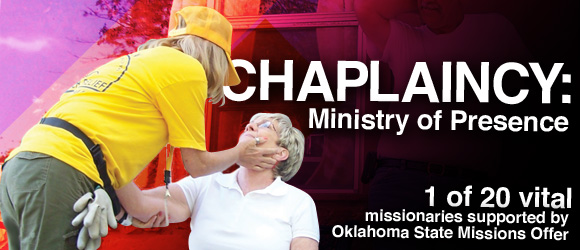Paul Bettis doesn’t work at a gym, but he has trained more than 600 people during the past seven years.
Not trained them in the “body-building” sense, but helped them to minister to others struggling with emotional and spiritual issues.
Bettis, chaplaincy specialist for the Baptist General Convention of Oklahoma (BGCO), has conducted training sessions that have led the BGCO to be among the leaders in the Southern Baptist Convention (SBC) when it comes to chaplaincy.
Chaplaincy, which has often been called a “ministry of presence,” is one of the featured ministries of the 2011 Oklahoma State Missions Offering, which has a goal of $1 million. Chaplaincy’s designated allocation out of that goal is $64,000—40 percent of the office’s annual budget.
“We now have 205 endorsed chaplains and 117 who have been trained and are going through the process of endorsement,” Bettis said. “We have 13 more people who will be endorsed during a national commissioning ceremony on Sept. 13.”
Endorsement comes through the North American Mission Board of the SBC, which recognizes 72 areas of chaplaincy service. Oklahoma has chaplains serving in 28 areas—including one horseshoe-pitching chaplain—but the majority of state chaplains serve in seven major areas: corporate/industry, corrections, disaster relief, healthcare, law enforcement, military and pastoral counseling.
“Chaplaincy is the most effective means of reaching secular society because there are times chaplains can go where the church cannot go,” Bettis said. “Chaplaincy provides many opportunities to extend the ministry of the local church beyond the four walls of the church facility.
“Each of these areas of chaplaincy provides opportunities for full-time, part-time and volunteer participation of ministry oriented persons. Each category also provides the opportunity for the local church and its staff to extend their ministry into the community that may otherwise be closed to them.”
Interest in chaplaincy has grown exponentially since the terrorist attacks of Sept. 11, 2001. By far, most BGCO chaplains are endorsed disaster relief chaplains, and training focuses on that subject because all chaplain responses relate to a critical incident of some kind, whether it’s an explosion, a train derailment, an industrial accident, a shooting or a domestic incident.
Two areas which have grown in Oklahoma the past few years specifically are motorcycle and oil patch chaplaincy.
Don Hunter leads the motorcycle chaplaincy ministry, which has made inroads at both the annual Sparks Bike Rally in Oklahoma and the Sturgis, S.D. Motorcycle Rally.
Tom Beddow directs oil patch chaplaincy, which is the newest area.
“We have people trained across the United States, literally, in oil patch chaplaincy now,” Bettis said, “including Texas and North Dakota, and we’re looking to go internationally into Canada.”
Another new effort is a Job Corps program that helps incarcerated felons being released from prison adjust to life on the outside and get a job.
“That’s a very new thing and has been very successful,” Bettis pointed out. “Our next training class beings Sept. 12, and by the end of the year, we’re hoping to have 50 who have graduated from the Job Corps program. We have had four classes thus far, and the success rate of our 26 graduates finding employment is about 75 percent.”
Bettis said his office needs additional volunteers for the Job Corps program.
“We’re looking to expand into another release center and we need more help to do training for them,” he explained.
The Job Corps curriculum is called Jobs for Life. It includes areas such as money management and anger management. Classes last two weeks—a total of about 80 hours—daily from 8 a.m.-4 p.m.
“We graduate them on a Friday night with an actual ceremony,” Bettis said. “We actually have caps and gowns now and they get to keep their tassel, just like in high school and college. It’s really neat because most of them have never graduated from anything.
“Also, we provide clothes for them to wear as they go out looking for a job, and we help them build a resume.”
The BGCO Chaplaincy Office has set up computer banks at two area churches to help the Job Corps graduates with their job search.
“In the past, when they became eligible for job searches, the state told them, ‘Go find a job.’ Well, they’d say, ‘Where?’ and they were told to go get a phone book or go to Sonic,” Bettis said.
“When our guys graduate, they’ll have a list of places that are hiring that they can go to and apply for a job. So, we’re giving them a hand up that other men who don’t go through the program don’t have. It’s a good program and it’s helping them.”





